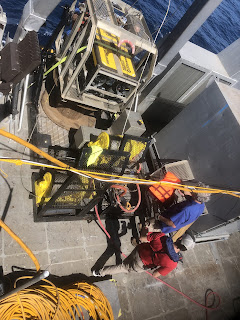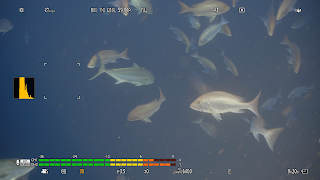Shakedown
 |
| Preparing to deploy the ROV on Sea Scout. The vehicle itself is in the cage, and they're both lowered over the side with the winch. |
The day started with the ROV team and videographers working together to integrate their systems. As I mentioned, the ROV we're using isn't typically used for research, so we added an extra camera for data collection at higher resolution. Whenever you try to integrate systems, there will inevitably be a thousand tiny things that go wrong and have to be addressed, and that was definitely the case yesterday. It took a long time.
My major goal for the day was to get the ROV wet - just put it in the water, I didn't care how deep. We were eventually able to dive in the evening, although that was a shakedown of its own. The captain watched from an upper deck while the ROV was loaded into the water, and he had plenty of notes to share on how to streamline the procedure and make it safer.
When we reached the bottom, the vehicle stirred up some silt (that's actually normal) and creeped its way closer to the shipwreck. We never actually saw the wreck, but we did get extremely close. The video feed showed red snappers and amber jacks swimming around the vehicle. Both of those species like to be near hard structures, so I would bet that we were just outside visual range of the wreck itself.
 |
| Red snappers and amber jacks captured on video |
Of course it's disappointing to turn around without actually seeing the wreck, but that first site was low priority. Our shakedown served its purpose - we are much better prepared to dive on our high-priority sites now. Weather, electronics, and Poseidon willing, we will get our data.
Comments
Post a Comment